8 unstable releases (3 breaking)
| 0.3.1 | Nov 24, 2024 |
|---|---|
| 0.3.0 | Nov 17, 2024 |
| 0.2.1 | Jul 11, 2024 |
| 0.1.2 | Jun 6, 2024 |
| 0.0.1 | Apr 25, 2024 |
#630 in Game dev
27 downloads per month
335KB
5K
SLoC
🐭 Chuột
Website
AGPL licensed and opinionated game engine for 2D pixel-art games.
Features
- Pixel-perfect pixel art rendering with built-in rotsprite rotation shader.
- Window creation with independent update and render game loop.
- Hot-reloadable assets, seeing your assets update live in the game when you save them is a great boost in productivity for quickly iterating on ideas.
- Single-binary, all non-texture assets will be embedded directly, and textures will be diced into a single atlas map embedded in the binary when deploying.
- Simple bitmap font drawing.
- OGG audio playback.
- First-class gamepad support.
- Separate managed camera systems for UI and game elements.
Goals
- Ergonomic API with a focus on quickly creating small games, especially for game jams.
- Reasonable performance, drawing thousands of animated sprites at the same time shouldn't be a problem.
- Proper web support, it should be very easy to bundle as WASM for the web.
Non-Goals
- An ECS (Entity component system), although an ECS architecture is great for cache locality and thus performance, I feel that it's overkill for most small games. Nothing is stopping you to add your own on top of this engine if that's what you want though!
- 3D, this engine is only for 2D pixel art.
- Vector graphics, similar to the above, this engine is focused specifically on pixel art with lower resolutions.
- Reinventing the wheel for everything, when there's a proper crate with good support I prefer to use that instead of creating additional maintainer burden.
- Support all possible file formats, this bloats the engine.
Usage
Using this crate is quite simple, there is a single trait Game with two required functions, Game::update and Game::render, that need to be implemented for a game state object.
use chuot::{Config, Context, Game};
struct MyGame;
impl Game for MyGame {
fn update(&mut self, ctx: Context) {
// ..
}
fn render(&mut self, ctx: Context) {
// ..
}
}
// In main
let game = MyGame;
game.run(chuot::load_assets!(), Config::default());
Features
embed-assets
Embed all assets into the binary when building.
Must be enabled when building for the web. If disabled all assets will be loaded from disk.
This will dice all PNG assets into a single tiny optimized PNG atlas. On startup this diced atlas will be efficiently uploaded to the GPU as a single bigger atlas, which will be used for all static sprites.
read-texture (default)
Expose read operations on images, if disabled sprites will be uploaded to the GPU and their data will be removed from memory.
Install Requirements
On Linux you need to install asound2-dev for audio and udev-dev for gamepads:
sudo apt install libasound2-dev libudev-dev
Example
This example will show a window with a counter that's incremented when pressing the left mouse button^left-mouse. The counter is rendered as text^text loaded from a font in the top-left corner. When the 'Escape' key is pressed^escape-key the game will exit and the window will close.
use chuot::{Game, Context, Config, MouseButton, KeyCode};
/// Object holding all game state.
struct MyGame {
/// A simple counter we increment by clicking on the screen.
counter: u32,
}
impl Game for MyGame {
fn update(&mut self, ctx: Context) {
// ^1
// Increment the counter when we press the left mouse button
if ctx.mouse_pressed(MouseButton::Left) {
self.counter += 1;
}
// ^3
// Exit the game if 'Escape' is pressed
if ctx.key_pressed(KeyCode::Escape) {
ctx.exit();
}
}
fn render(&mut self, ctx: Context) {
// ^2
// Display the counter with a font called 'font' automatically loaded from the `assets/` directory
// It will be shown in the top-left corner
ctx.text("font", &format!("Counter: {}", self.counter)).draw();
}
}
// In main
// Initialize the game state
let game = MyGame { counter: 0 };
// Run the game until exit is requested
game.run(chuot::load_assets!(), Config::default().with_title("My Game"));
Rotation Algorithms
In the library it's possible to choose between multiple upscale implementations for the single-pass RotSprite algorithm, see the Rust documentation for more information:
Nearest Neighbor
This doesn't apply any extra rotation effects.
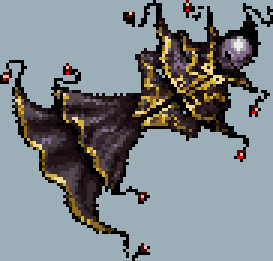
cleanEdge
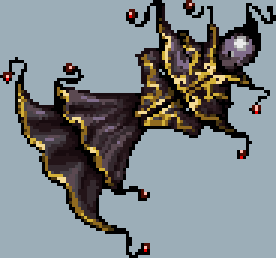
Scale3x (default)
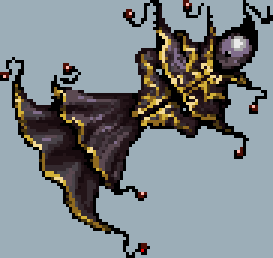
Diag2x
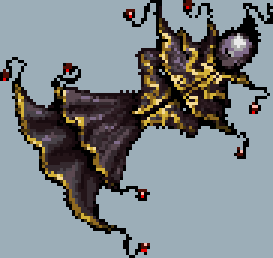
Scale2x
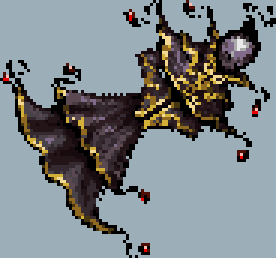
Dependencies
~20–58MB
~1M SLoC